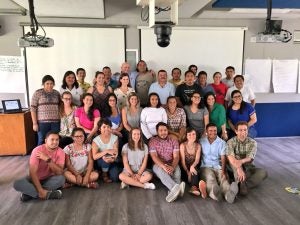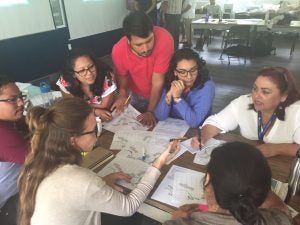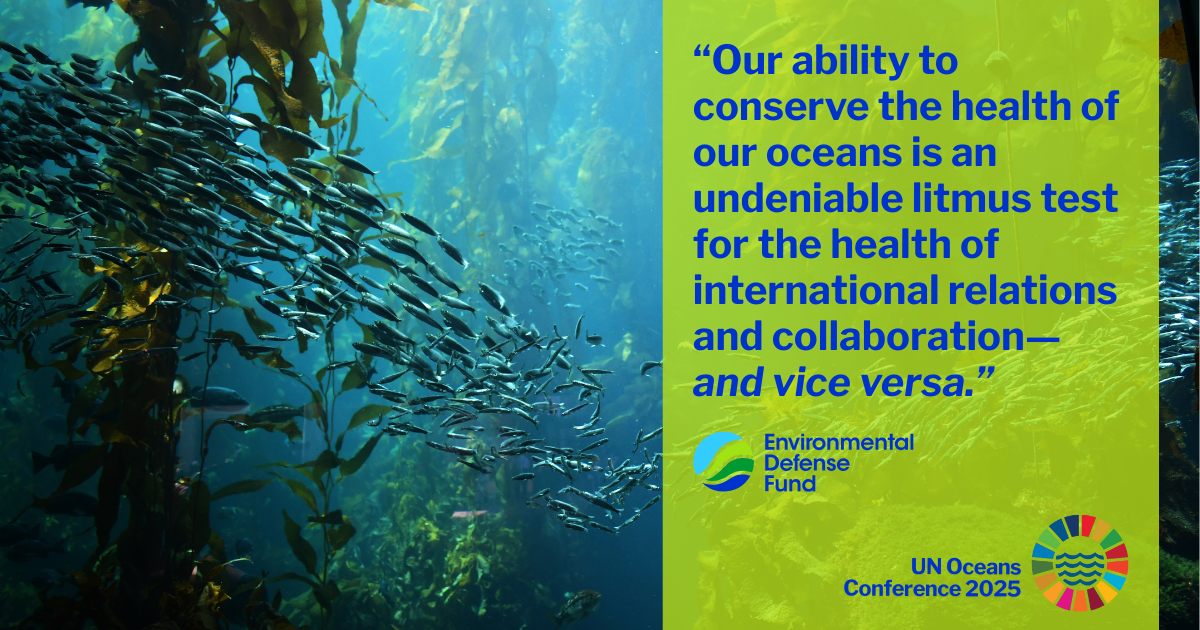The Mesoamerican Reef: A shared vision for prosperity and conservation
Working with the next generation of conservation leaders in the MAR
Transformative change on an ecosystem scale is extremely challenging. But in the Mesoamerican Reef (MAR)— stretching 600 miles of coral reefs, mangrove forests and seagrass beds along the coasts of Mexico, Belize, Guatemala and Honduras—sustaining a rich array of biodiversity and thousands of local people, it is happening. Leaders from all four countries recently convened on a shared vision for prosperity and empowered coastal communities—setting a new course for sustainable fishing and ecotourism in the region.
The complex balance of the coral reefs, mangroves and seagrasses protect and nurture more than 500 species of fish—essential in these countries for food security, economic development, and poverty alleviation. The beauty of the reefs attract visitors and ecotourism dollars to local communities.
Engagement and leadership by these local communities is crucial to conserving this vital ecosystem for the future. That’s why EDF teamed up with the Mesoamerican Reef Leadership program to bring together twenty exceptional leaders from all four countries for a collaborative workshop on sustainable small-scale fisheries projects. The MAR Leadership program is a joint initiative of the Mexican Fund for the Conservation of Nature, A.C. (FMCN) and The Summit Foundation which aims to advance and accelerate long-term conservation in the Mesoamerican Reef ecoregion by training the next generation of regional leaders.
During the workshop, the group explored how fisheries reform and good governance of the oceans can be a catalyst for growth and sustainable development – including meeting the United Nations Sustainable Development Goals. EDF shared our Sustainable Fisheries Toolkit and introduced methods for science-based management in data-limited fisheries to help support the MAR leadership projects.
One of the most illuminating parts of this collaboration was a discussion on how each of these projects are helping their stakeholders and communities meet the United Nations Sustainable Development Goals (SDGs). SDG #14 is focused on Life Below Water, but when we did a deep examination of the bold ambitions for these projects, we saw how they also helped with poverty alleviation, food security, equality, health, education and climate adaptation. Mapping the projects to the SDGs reinforced how critical sustainable fisheries and oceans conservation is to the overall sustainable development of the Mesoamerican Reef region.
The projects include innovative and bold initiatives to generate an upward spiral of sustainable resource management, conservation and economic benefits for coastal communities—focused on sustainable fishing, ecotourism and local markets—including:
- Creating a binational learning network that will build capacity for communities and help overcome fisheries management challenges in Mexico and Honduras
- Strengthening livelihoods and reducing overfishing by supporting responsible fishing and tourism in the Bahia Espiritu Santo, Mexico
- Improving the health of the Mesoamerican Reef and livelihoods in the tourism sector through planning a sustainable marine tourism and recreation program in Roatan, Honduras
- Protecting a threatened and endangered species while ensuring the sustainability of livelihoods from a small-scale fisheries in the marine and estuarine Corozal Bay Wildlife Sanctuaries in Belize
- Strengthening the protections of sharks through compliance with international agreements that regulate sustainable trade in Guatemala
- Creating new market opportunities for the sustainable management of mangrove-associated fisheries in the Refugio de Vida Silvestre Punta de Manabique, Guatemala
Participants in the program are now leading and inspiring change throughout the region. For example, MAR Leaders from Belize have been at the forefront of the transformational change in Belize’s fisheries management. This includes a national fishing rights program called ‘managed access’—which is already yielding benefits for fishermen and the ecosystem.
In fact, the MAR leaders had the chance to learn about many examples of innovation and reforms already happening in the MAR region including:
- In Quintana Roo, Mexico stakeholders implemented a fishery improvement plan that increased the value of the spiny lobster fishery and improved livelihoods of fishermen.
- Cabo Pulmo in Baja Sur, Mexico was protected to conserve its magnificent reef and the lucrative tourism industry.
- The Healthy Reefs Initiative provided an overview of how to effectively monitor the health of the reef using ecosystems indicators.
 EDF is honored to partner with these talented and passionate leaders. Together we built a vision for how a network of sustainable small-scale fisheries and empowered communities can create a blue economy for the Mesoamerican Reef. Equipped with tools and experiences provided by MAR Leadership Program, EDF and other organizations that have led reform for small-scale fisheries in the region, the MAR Leadership cohort for 2018-2019 is prepared to help lead a movement for small-scale fisheries and conservation in the Mesoamerican Reef.
EDF is honored to partner with these talented and passionate leaders. Together we built a vision for how a network of sustainable small-scale fisheries and empowered communities can create a blue economy for the Mesoamerican Reef. Equipped with tools and experiences provided by MAR Leadership Program, EDF and other organizations that have led reform for small-scale fisheries in the region, the MAR Leadership cohort for 2018-2019 is prepared to help lead a movement for small-scale fisheries and conservation in the Mesoamerican Reef.
Acknowledgements:
Presenters at the workshop included an array of institutions leading change for small-scale fisheries throughout the region including the Healthy Reefs Initiative, Comunidad y Bioversidad (COBI), the World Bank Marine Climate Change Adaptation Program, El Fondo Mexicano para la Conservación de la Naturaleza, Amigos de Cabo Pulmo, Pixan’Ja Consultancy, Centro de Estudios Marinos, Alianza Kanan Kay, FUNDAECO, Belize Fisheries Department, Wildlife Conservation Society, Future of Fish, GEF Small Grants Program of the United Nations Development Program, and Community Tours Sian Ka’an.














